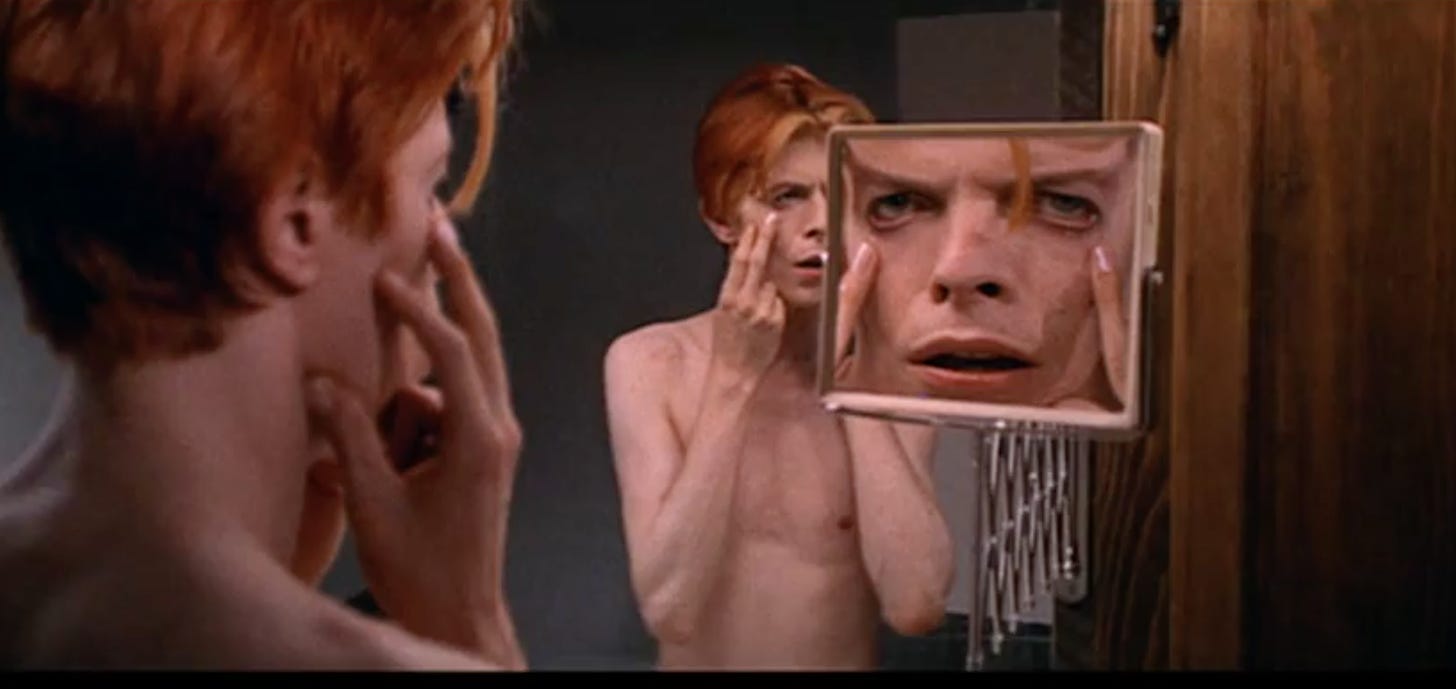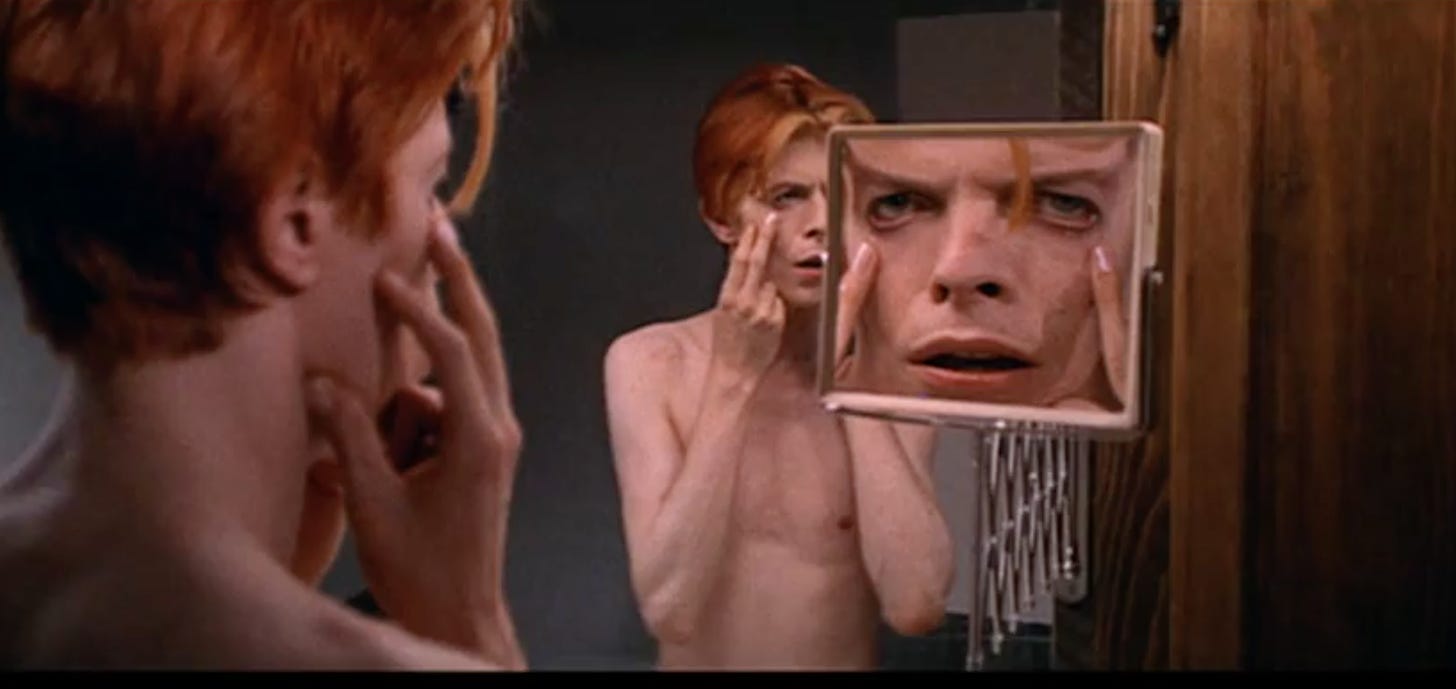Bowie on Film, Part 2: Arthouse Actor
In working with world-class auteurs for 'The Man Who Fell to Earth' and 'Merry Christmas, Mr. Lawrence,' David Bowie was inspired to bring a lot of himself into his roles.
Inspired by Brett Morgen’s new documentary Moonage Daydream, we’re spending the three weeks talking about David Bowie and the movies. Last week, we discussed films about Bowie the musician, including Moonage Daydream and some key music videos. This week, we’ll be looking at his work in a pair of acclaimed films from famed directors — The Man Who Fell to Earth and Merry Christmas, Mr. Lawrence — before wrapping things up next week with a look at some of his work in big movies like The Hunger and Labyrinth.
Keith: It must have seemed a bit like stunt casting to give the lead of a movie about a beautiful alien who climbs the heights of fame to David Bowie in the 1970s. And maybe it was stunt casting. By the time Nicolas Roeg shot The Man Who Fell to Earth in 1975, Bowie had moved out of his Ziggy Stardust phase, discarding the persona of the doomed, androgynous creature from the stars and moving onto the self-described “plastic soul” phase of Young Americans, which offered his own spin on ’70s R&B music. (You can even see the cover of Young Americans toward the end of The Man Who Fell to Earth when Rip Torn’s Dr. Nathan Bryce visits a record store.) But Ziggy hadn’t vanished from the public consciousness, and even without him, there was always something a little otherworldly about Bowie.
Yet watching Man again — and it’s a film I’ve found myself revisiting quite often over the years — I’m struck not only by how good Bowie is in the role but by how easy it is to put aside all the extraneous information we know about Bowie while watching the film. He plays Thomas Jerome Newton as brilliant, delicate, and decorous, all qualities that match with Bowie’s own public persona at the time. (For all the wildness of his performances and the stories of his off-stage life, he was always very polite and thoughtful in interviews, even the Cracked Actor scenes in which he barely seemed to be keeping himself together.) But Newton never seems less than fully his own character, and I find his journey from splashdown to his drunken, resigned final moments with his head hanging low as the plants blow in the breeze behind him beneath the closing credits moving in ways that have nothing to do with Bowie’s biography.
Roeg throws a lot into this movie, stylistically and thematically. Forget the end of 2001: A Space Odyssey: the sequence in which Newton and his companion Mary-Lou (Candy Clark) drive through the countryside and seemingly tear a rip through time to the accompaniment of “Try to Remember” is the closest I’ve come to feeling like I was losing my mind while watching the movie. But I think everything hangs off a pretty simple central idea that it shares with the Walter Tevis novel it adapts: the world kills genius a little bit at the time. Newton arrives on Earth with a clutch of brilliant scientific innovations the likes of which humanity has never seen and a clear mission: rescue the people of his dying planet. Then he gets distracted and sidelined: by alcohol, romantic attachments, money, fame, the comforts of domesticity, the guardians of the status quo and other factors until he loses his way. It’s a chilling, visually stunning, formally audacious film that sponges up the media-saturated culture of the 1970s. But what it’s about is right there in the title.
Scott, what do you think of this movie? Of Bowie’s performance? And has how you look at it changed over the years?
Scott: Let me answer the last question first. We’ve had a lot of time these past few years—time spent in quiet contemplation at home, watching the rest of the world largely from afar—to witness the essential corruptibility of humankind, even in the face of a mortal crisis. The innovations that Newton offers to humans are not strictly gifts, though, however much they enhance life on earth. He needs to make great gobs of money on them in order to build the spaceship that will bring him home and save his drought-ridden planet. That makes The Man Who Fell to Earth a film about commercial art, which is a lot messier than a film about tarnished genius. Surely Bowie, who was deeply (and, in this period, adversely) affected by his own unlikely popularity, could connect with that theme on a personal level.
Keep reading with a 7-day free trial
Subscribe to The Reveal to keep reading this post and get 7 days of free access to the full post archives.






